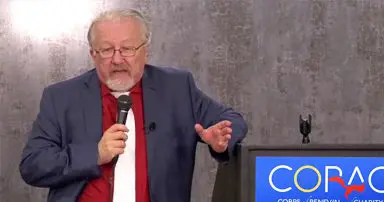Front Royal, Virginia –
Dear Bishops,
Though I have not lived in Chicago for nearly two decades, I remain a Cubs and a Bears fan. Even when they are terrible (and I have lived through plenty of that), despite the grousing and complaining, I want them to do well – or at least begin the process of getting rid of what ails them. I am always willing their good. Strong is the bond with institutions we once fell in love with.
My attachment to the Catholic Church is far stronger than that and much more soundly developed. When I began to consider the Catholic Church seriously in 1990 I, of course, enrolled in RCIA (at St. Gilbert’s Parish in Grayslake, Illinois) for instruction. Perhaps more importantly, I immediately started reading voraciously. I started with the Documents of Vatican II. I LOVED them. (Later, I was to discover the documents were an entirely different thing than the pernicious “spirit” of Vatican II, so beloved by the satan’s men in clerical garb). I read the Church Fathers, the Catechism, histories of the Church, various Encyclicals. I was fully Catholic well before I was received into the Church at the Easter Vigil in 1991 – and, in many ways, before I even began to seriously consider her. My ethnicity, race, and political beliefs had nothing to do with it and were no barrier to my entry – just as when Christ first formed the Church. The Catholic Church calls to all – and it called to me.
Even while I was an inquirer in RCIA, I heard some errors taught from the podium. That didn’t bother me…it was just the human condition. My growing faith was based on rock: Scripture, Holy Tradition, and the Magisterium. There is only one Magisterium. It can be developed and refined, but it cannot contradict itself. The Pope is called to be its primary guardian. There is no such thing as a “Pope’s magisterium,” a silly notion which reduces it to a politician’s vapid and transient political platform. In fact, about three months in I started gently correcting and clarifying doctrinally ambiguous errors when they were proclaimed in class. Because I obviously respected and appreciated the work being done by mostly volunteers, out of love for the faith, my comments were accepted with good cheer and increased, rather than decreased, our mutual affection. The day I was received into the Church was the pivotal turning point of my life – and I thank you all for preserving and propounding what is my spiritual home.
And so, dear Bishops, I very much want you to be held in honor, esteem, and deep filial affection. I want you to be taken seriously. More than I want the Cubs or the Bears to win. I have had the good fortune to know quite a few of you in America, privately breaking bread with some of you, collaborating with others on specific projects, and even clashing with a few. I have seen many of your hearts and know that you want to do what is right and proper. But these are befuddling times for all of us.
It pains me to see you treated with disrespect…or even contempt. No little kid wants to see his Dad beat down or publicly humiliated. Even worse for the kid is when he must confess to himself that Dad kind of had it coming.
I know that running a Diocese is much harder than it looks. Every large organization is actually a coalition of competing interests united by fealty to several overriding primary – or first – principles. The leader of the organization is called to keep his people focused on those first principles, in part, by fairly, decisively, and diplomatically mediating disputes between partisans of secondary principles that arise. It is much harder than it sounds. Right now, you have significant pressure from above – or at least no help from the Vatican. You have pressure from below; some activists who insist on making the Church into a social justice NGO, stripped of any transcendent reality – and others who want to condemn any social community beyond worship and devotion as somehow sacrilegious. You have had a hostile culture to work in and, for some years, an even more hostile government that was targeting you with a soft persecution. Some of you are not sure what to do to turn things around – while you have to worry that any decisive action you take might make things worse. It is a tough time in America to be a Bishop.
Right now you are on a hot seat over illegal immigration. Yes, I know that you spend more on services for migrants and aliens than the federal government has given you, even as federal contracting reached the level of 50% of the budget for Catholic Charities. You feel the sting of receiving opprobrium for doing what the previous administration encouraged you to do and rewarded you for…even while jailing your parishioners for doing those things it didn’t like, such as praying in front of abortion clinics. It is bewildering, but in the midst of the fog you realize that you aren’t driving anything these days, but instead are being driven by forces that have little, if anything, to do with Catholic Christianity.
I understand at least some of your problems. For many years I was essentially the Prime Minister of various organizations as expansive as yours and some even larger. Before that I was the chief diplomat and arbiter in a county political party of over 600,000 people. I did conciliate the tough internal disputes – and was often called in to work through intractable disputes between the opposing political parties. To do it successfully while being acknowledged as a vigorous conservative Republican public activist and simultaneously being acknowledged by almost all as an honest broker in private was a brutally hard task. There were five foundational principals that guided me. I’m going to share them with you:
- Focus: Keep your primary mission at the forefront at all times. Don’t go meddling in subordinate disputes among your active adherents. Bears fans, Packer fans, Colts fans, and Rams fans all worked together in my coalitions…and largely in harmony. Same with fans of various styles of music. Your primary mission is to proclaim the Gospel and form Christians. You have gotten far too deeply involved in mere political disputes. Except for defining and advocating for specific religious and moral principles, stay out of politics. Sometimes you think a political stance is amenable to your mission, and so eagerly support it believing it will enhance your presence and stature in the culture. It may for a time, but it will eventually bite you, as the worm turns or people come to view you as just another voice alongside the precinct captain. If you do not HAVE to weigh in on a matter, you should NOT speak on it. Guard your mission and the prestige that attaches to it jealously – proclaiming the Gospel and forming Christians. As a practical matter you should never have allowed your social justice ministries to devolve into helping people evade the law (unless it was unjust to begin with – and poorly formed personal beliefs that ignore large swaths of actual Catholic teaching do not qualify you to decide a policy is unjust.) You risk becoming a co-conspirator with a faction propping up its political agenda. Had you guarded your prestige more carefully, you could have used it to advocate much more effectively for genuine legal reforms to immigration without ignoring or impugning the just concerns of native American citizens. You could also have used moral capital to demand reform in those countries from which immigrants are fleeing. Instead, you allowed yourself to be boxed in as gauzy partisans. Always keep your focus on your primary mission.
- Humanity: Sometimes you must argue and fight. When you do, argue with men. Do not argue with caricatures you concoct. Keep your opponents’ humanity firmly in mind. Some 40 years ago I found myself seated, at a large public dinner, next to an oft-maligned regional official and his wife. I was a newspaper columnist at the time. After dinner his wife started gushing to me about how much they loved my column. She hated most of the coverage they got, but loved mine. I didn’t doubt her, as everyone in power in the region talked to me when I called. After a bit, puzzled, I asked her why – because I probably criticized her husband more often than anyone else in the press. She paused, looked baffled for a moment, then said, “Yeah, you do. But you always treat us like real people…and we both appreciate it a lot.” Our good, cheery conversation went on. I have not always lived up to that standard…but I try, and somehow people sense it. Argue with men, not caricatures. To do the latter diminishes you in public esteem whatever it does to your opponent.
- Research: The quality of the research you have done for you on serious issues before making a public statement is absolutely abysmal. Most of it consists of pious platitudes with little depth, while completely ignoring problems created by your stated positions. It is not that you are wrong, but that you emphasize one good completely out of proportion and beyond reason while ignoring the negative consequences of that over-emphasis. You did NOT want to condemn 350,000 children to human trafficking for sex or labor, but that IS a consequence of your implicit endorsement of open borders. So are all the fentanyl deaths. So is the upward pressure on housing costs and the downward pressure on entry-level jobs. Yes, I know you give flaccid lip service to the right of a nation to protect itself from criminals, but it fools no one, particularly when the largest segment of your social services budget comes from the government that encouraged this. I hired – and fired – a lot of researchers in political campaigns and public office. My demand was that they fully flesh out ALL the consequences of a particular policy and suggest ameliorations to the negative consequences that come from even the best policies. Further, they must be able to express the opposition’s position more fully, completely, and convincingly than the opposition, itself, could. Once I had that, I could send my principal out with confidence that he was unlikely to be tripped up. The problem is not the formal language you use for pronouncements, but the shallow gauziness of the substance involved. You end not adding much of anything to the issue except an endorsement for one side or another. Even your allies on a particular issue can make little use of its reasoning, for aside from the wordiness of it, there usually is not much there, there. Please adopt real rigor. I don’t mind disagreeing with a position, but it embarrasses me that so many of the positions of my spiritual fathers are so shallow and vague. Obviously, some individual Bishops already do it pretty well. I admire, and can sink my teeth into, pronouncements by my own Archbishop, Samuel Aquila. Documents from Abp. Salvatore Cordileone, Bp. Thomas Paprocki, and Abp. Alexander Sample are, among some others, usually always meaty and worth real consideration. But the tripe that generally comes from the USCCB is usually painful – and leaves me embarrassed for the organization.
- Creative Tension: I loathe groupthink. Even in my biggest campaigns, I almost always had a contradictory voice in the senior staff…and always had contradictory voices (even including some Democrats) in the lower and subordinate levels. It keeps you on your toes. They will come up with some good things you had not considered and will also give you practice with the arguments you are likely to encounter. More than a few times, out of the parrying, would emerge an idea that neither side had previously considered, and constituted an elegant solution. I have met with some very good advisors in Chanceries, but I have met a LOT more men with soft hands and even softer heads advocating for their priority with smug self-righteousness. Diversify your central staff. Get some people close to you who have accomplished things in business, communications (go light on journalists – the profession is at an historic nadir. Better to get solid communications directors from companies in unpopular industries), technology, trades, and even politics. The head of an organization is always subject to flattery. With a Bishop, it is baked into the cake before he ever gets his first Ordinariate. You need a corrective for that. Find people with substantial real-world experience who are entirely loyal, but empowered to speak plainly and candidly to you in private. That, alone, will improve your public profile dramatically and quickly.
- Public Statements: Do NOT speak on matters you do not need to. Do not speak on things you have not fully vetted and examined. That does not mean you must become reactionary: you can reasonably anticipate most things that are going to become social flash points. You can research them fully well before they dominate the culture, particularly if you have surrounded yourself with a diversity of experience and viewpoints. Do NOT just consider how to prevail in the controversy of the day; consider how the principle you evoke would affect every other thing you promote. If you are just opportunistically evoking one principle on a subject when it is to your advantage, and the equal and opposite principle when IT is to your advantage, you diminish your stature and influence in the public sphere. On this one, I will use an example – and I apologize in advance to El Paso Bishop Mark Seitz, head of the USCCB’s Committee on Migration . I don’t know him and have had no interaction with him. He may be a very fine man and Bishop. But his speech at Georgetown University on Feb. 12 was a public relations disaster, even if everyone in the audience agreed with him. He was clearly hurt by Vice-President J. D. Vance’s question of whether the Bishops’ position on illegal immigration was more motivated by humanitarian concerns or concerns for their own bottom line. Bp. Seitz was doing well, expressing frustration and inviting VP Vance to sit down with him, until he got to the points where he suggested that the way the administration frames the issue allows “many to hear that at least and say, ‘if the person is brown, you know, they’re bad.’” First of all, it leaned heavily on the “racist” trope, a form of emotional blackmail that people are completely done with. It did not directly insist that Vance is a racist, but if you take the charitable interpretation of the comment, it means Bp. Seitz is concerned that Vance would rile up all the incipient racists in the pews. I honestly don’t think that is what Bp. Seitz meant, but when you rely on stereotypical tropes, this is what happens. If I had been the ‘Prime Minister’ in Bp. Seitz’ Chancery, we would have had a very vigorous and animated discussion behind closed doors when he got back. If he does not have someone who will do that for him, he does himself a great disservice.
I want our Bishops and hierarchy to be held in great esteem – and for their pronouncements to carry weight…but it has to be earned and stay focused on first principles. A Bishop is not primarily an administrator, a diplomat, a fundraiser or even a theologian, though he must do all those things to live his office well. He is first and foremost an Apostle of the Living Christ. Everything he says and does must proclaim Christ’s good news with boldness, fidelity, and humility.
Opprobrium and celebration are like the weather. We will experience plenty of both on our pilgrim journey through life. But our decisions must never be to merely avoid opprobrium. In a wicked age, proclaiming the Truth of Christ and His promise of eternal salvation will draw more opprobrium than celebration – especially from those who seek license to indulge their appetites.
I love the majesty of my Church and the clarity of its doctrine through Scripture, Sacred Tradition, and the Magisterium. I deeply want the good for its hierarchy of Bishops and Priests…for their good is my good is the Church’s good and is what Christ intends. I pray for all Bishops, Priests, Pastors (of all Judeo-Christian faiths), Religious, and Servants of God every day, even when I vigorously and publicly criticize them. I pray that these principles may be of some use to some of you.
Ut unum sint.
Ave Maria, Stella Maris!

If communication goes out for any length of time, meet outside your local Church at 9 a.m. on Saturday mornings. Tell friends at Church now in case you can’t then. CORAC teams will be out looking for people to gather in and work with.
Find me on X at @JohnstonPilgrim
The Corps of Renewal and Charity (CORAC)
18208 Preston Rd., Ste. D9-552
Dallas, Texas 75252
























0 Comments